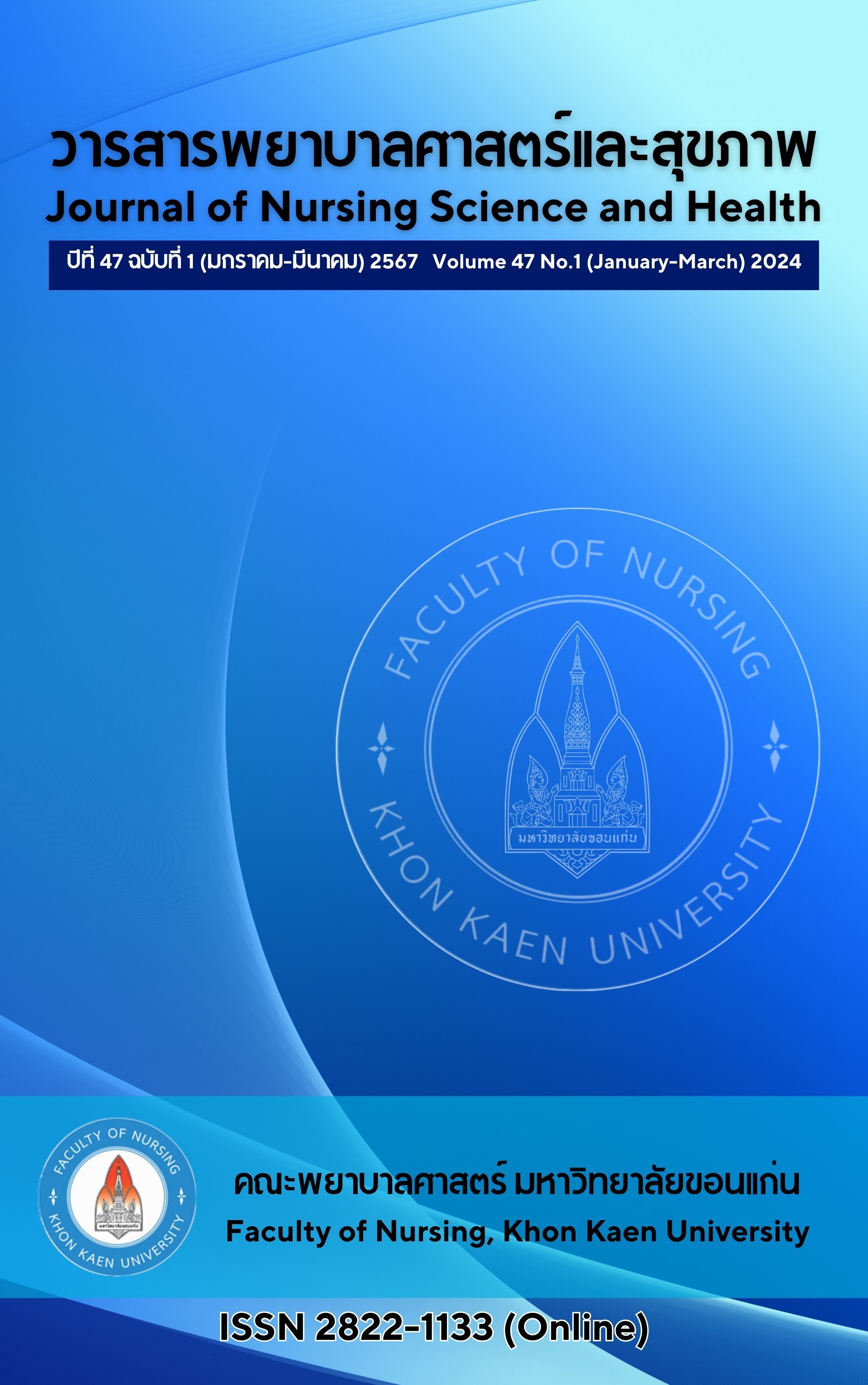การพัฒนาเครื่องมือวัดความรู้การกำกับตนเองทั้งในด้านการปฏิบัติหน้าที่และการสนองตอบทางอารมณ์ของมารดาคลอดก่อนกำหนดที่ทารกต้องเข้ารับการรักษาในหอผู้ป่วยหนักทารกแรกเกิด
คำสำคัญ:
การกำกับตนเอง , การพัฒนาเครื่องมือ , ความรู้, ทารกคลอดก่อนกำหนด , หอผู้ป่วยหนักทารกแรกเกิดบทคัดย่อ
การส่งเสริมความรู้ในการกำกับตนเองของมารดา ในการทำหน้าที่และเตรียมพร้อมก่อนเข้าเยี่ยมหรือรับรู้กับสถานการณ์ทารกเกิดก่อนกำหนด ที่ต้องเข้ารับการรักษาในหอผู้ป่วยหนักทารกแรกเกิดให้มีประสิทธิภาพมากขึ้น จำเป็นต้องวัดความรู้การกำกับตนเองของมารดาด้วยเครื่องมือที่มีคุณภาพน่าเชื่อถือได้ วัตถุประสงค์บทความวิจัยนี้ เพื่อพัฒนาเครื่องมือวัดความรู้การกำกับตนเอง ทั้งด้านการปฏิบัติหน้าที่และการสนองตอบทางอารมณ์ของมารดาคลอดก่อนกำหนด ที่ทารกต้องเข้ารับการรักษาในหอผู้ป่วยหนักทารกแรกเกิด เครื่องมือนี้ตรวจสอบคุณภาพโดยผู้เชี่ยวชาญที่แตกต่างกัน จำนวน 5 คน ประกอบด้วย อาจารย์พยาบาลทารกแรกเกิด จำนวน 3 คน และพยาบาลชำนาญการ ประจำหอผู้ป่วยหนักทารกแรกเกิด จำนวน 2 คน กลุ่มตัวอย่าง คือ มารดาทารกคลอดก่อนกำหนด จำนวน 10 คน คัดเลือกแบบเฉพาะเจาะจง เครื่องมือที่วิจัย คือ แบบสอบถามวัดความรู้การกำกับตนเองของมารดาคลอดก่อนกำหนด แบ่งการดำเนินการเป็น 2 ขั้นตอน ได้แก่ 1) การดำเนินการสร้างเครื่องมือ และ 2) การตรวจสอบคุณภาพเครื่องมือ วิเคราะห์ข้อมูล โดยหาค่าความตรงเชิงเนื้อหา และหาค่าความเชื่อมั่น ผลการศึกษา พบว่าเพิ่มเติมรายละเอียดเนื้อหาบางประเด็นจากการทบทวนวรรรกรรม สร้างเครื่องมือและปรับแก้ตามข้อเสนอแนะตามผู้เชี่ยวชาญ และตรวจสอบคุณภาพ โดยหาค่าความตรงเชิงเนื้อหา CVI, S-CVI, และ ACP เท่ากับ .83, .91 และ .91 ตามลำดับ และค่าความเชื่อมั่น KR-20 เท่ากับ .79 สรุปผลเนื้อหาเครื่องมือครอบคลุมความรู้ การกำกับตนเองของมารดาทั้งในด้านการปฏิบัติหน้าที่ และการสนองตอบทางอารมณ์ และคุณภาพเครื่องมือมีค่าความตรง และความเชื่อมั่นผ่านเกณฑ์มาตรฐานที่มีความเหมาะสมต่อการนำไปใช้งานตามหัวข้อวิจัยต่อไป
เอกสารอ้างอิง
World Health Organization. Survive and thrive: Transforming care for every small and sick newborn [Internet]. Geneva: WHO; 2019 [cited 2023 May 10]. Available from: https://www. who.int /en/news-room/fact-sheets/detail/preterm-birth
Ministry of Public Health. Service plan low birth weight rate [Internet]. Nonthaburi: Ministry of Public Health; 2022 [cited 2023 Jun 10]. Available from: https://dashboard.anamai.moph.go. th/dashboard/lbwr/index?year=2022. (in Thai)
Kelly MM. Primary care issues for the healthy premature infant. J Pediatr Health Care 2006;20 (5):293-9.
Unsiam P. Maternal participation in caring for critically ill newborns, Phatthalung hospital. The Southern College Network Journal of Nursing and Public Health 2017;40(1):61-74. (in Thai)
Varma JR, Nimbalkar SM, Patel D, Phatak AG. The level and sources of stress in mothers of infants admitted in neonatal intensive care unit. Indian Journal of Psychological Medicine 2019;41(4):338–42.
Karuna P. Stress and coping mechanisms of mothers separated from their sick babies during postpartum period in Maharaj Nakhon Si Thammarat hospital. Maharaj Nakhon Si Thammarat Medical Journal 2018;1(2):67-77. (in Thai)
Johnson JE. Self-regulation theory and coping with physical illness. Research In Nursing & Health 1999;22(6):435-48.
Watthanasereewetch T, Chaiyawa W. The effect of providing concrete-objective information before the first visit to pediatric patients in intensive care unit on maternal anxiety. JRTAN 2017;18(3):91-9. (in Thai)
Sittipa K, Baosoung C, Sansiriphun N. Anxiety, social support, and postpartum functional status among first-time mothers. Nursing J 2017;44(3):30-40. (in Thai)
Kongroad S, Chirit C. Effectiveness of an education program on knowledge, attitude and practice of pregnant women with premature labour. JHS 2020;29(6):1055-61. (in Thai)
Norasan A, Gumjudpai S, Chamnankit P. A development of a knowledge management model through the integration of self-efficacy and self-regulation concepts to develop instructional ability of teachers in Nawa College, Nakhon Phanom University. Nakhon Phanom University Journal 2016;6(1):106-14. (in Thai)
Tanwattnasere P, Boonyalongkorn T, Tingsabhat S. Effects of physical education learning management using self-regulation learning achievement and emotional quotient of secondary school students. Academic Journal of Thailand National Sports University 2022;14(3):224-40. (in Thai)
Bunmachu D, Theunnadee SK. Effects of promotion program on perceived self-efficacy preterm caring behaviors of mothers and health status. Journal of Nursing and Health Care 2015;33(4):150-8. (in Thai)
Chupinijrobkob P. Effects of supportive-educative nursing system program on knowledge and caring behaviors among mothers of premature infants. Thammasat University Hospital Journal Online 2022;7(1):18-32. (in Thai)
Chetchotsak Y, Sitiwongsa P, Wongwi P. Effects of information giving on anxiety, knowledge and practice among mothers of infants with retinopathy of prematurity. Srinagarind Med J 2013;28(2):155-62. (in Thai)
Aldirawi A, El-Khateeb A, Mustafa AA, Abuzerr S. Mothers’ knowledge of health caring for premature infants after discharge from neonatal intensive care units in the Gaza strip, Palestine. Open Journal of Pediatrics 2019;9:239-52.
Wattananonsakul S. Validation of the measurement model of academic self-regulation Learning strategies among university students. JBSD 2017;23(2):43-60. (in Thai)
Wonginchan A, Tangpukdee J, Wonginchan S, Kearttiwongkru S, Khonggungong S. Development of an instrument for measuring health problem levels of school-aged children who have access to online media in the Thailand 4.0: MHP-SaC. Journal of Nursing Science & Health 2022;45(1): 99-111. (in Thai)
DeVellis RF. Scale development: Theory and applications. 3rd ed. Newbury Park: Sage Publications; 2012.
Polit DF, Beck CT. Nursing research: Generating and assessing evidence for nursing practice. Philadelphia: Wolters Kluwer Health/Lippincott Williams &Wilkins; 2012.
Polit DF, Beck CT. Nursing research: Generating and assessing evidence for nursing practice. 10th ed. Philadelphia: Lippincott Williams & Wilkins; 2017.
Chaichanawirote U, Vantum C. Evaluation of content validity for research instrument. Journal of Nursing and Health Sciences 2017;11(2):105-11. (in Thai)
Srisatidnarakul B. The methodology in nursing research. 4th ed. Bangkok: U & I intermedia; 2007. (in Thai)
Miles MS, Carter MC, Riddl J, Hennessey J, Eberly TW. The pediatric intensive care unit environment as a source of stress for parents. Maternal Child Nursing Journal 1989;18(3):199-206.
Vanichbuncha K. Using SPSS for windows to analyze data. 27th ed. Bangkok: Chulalongkorn University; 2015. (in Thai)
Zavala QOM. Effect of nursing interventions for stress management. Hospice & Palliative Medicine International Journal 2018;2(2): 99-105.
Somboon S, Rungamornrat S, Sangperm P. Factors associated with coping difficulty of mothers in transition period from neonatal intensive care unit to home. JFONUBUU 2019;27(4):32-41. (in Thai)
Yusoff MSB. ABC of content validation and content validity index calculation. Educ Med J 2019;11(2):49-54. doi:10.21315/eimj2019. 11.2.6.
Yusoff MSB. A systematic review on validity evidence of medical student stressor questionnaire. Educ Med J 2017;9(1):1–16. doi.org/10.21315/eimj2017.9.1.1.
Polit DF, Beck CT. The content validity index: Are you sure you know what’s being reported? Critique and recommendations [Electronic version]. Research in Nursing & Health 2006;29:489-97.
Waltz C, Strickland O, Lenz E. Measurement in nursing and health research. 3rd ed. New York: Springer Publishing Company; 2005.
Semho O, Wonginchan A. The development of maternal perceived self-efficacy in promoting preterm infant development assessment tool. Journal of Nursing Science & Health 2023; 46(3):14-26. (in Thai)
Hair JF, Hult GTM, Ringer CM. Primer on partial least squares structural equation modeling (PLS-SEM). California, CA: Sage Publications; 2014.
ดาวน์โหลด
เผยแพร่แล้ว
รูปแบบการอ้างอิง
ฉบับ
ประเภทบทความ
สัญญาอนุญาต
ลิขสิทธิ์ (c) 2023 วารสารพยาบาลศาสตร์และสุขภาพ

อนุญาตภายใต้เงื่อนไข Creative Commons Attribution-NonCommercial-NoDerivatives 4.0 International License.
วารสารพยาบาลศาสตร์และสุขภาพเป็นเจ้าของลิขสิทธิ์ในการเผยแพร่ผลงานที่ตีพิมพ์ห้ามผู้ใดนำบทความที่ได้รับการตีพิมพ์ในวารสารพยาบาลศาสตร์และสุขภาพไปเผยแพร่ในลักษณะต่าง ๆ ดังนี้ การนำบทความไปเผยแพร่ออนไลน์ การถ่ายเอกสารบทความเพื่อกิจกรรมที่ไม่ใช่การเรียนการสอน การส่งบทความไปตีพิมพ์เผยแพร่ที่อื่น ยกเว้นเสียแต่ได้รับอนุญาตจากวารสารพยาบาลศาสตร์และสุขภาพ



